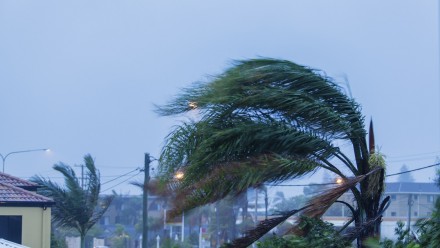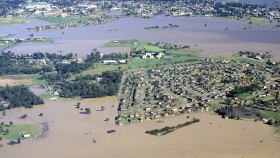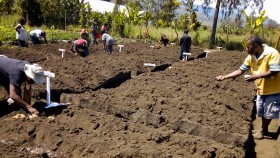ANU Climate, Energy & Disaster Solutions Highlights 2022
2022 in Review: Strengthening Ambition and Action
For many Australians, 2022 will be remembered by the heavy rains and storms that battered the east coast, resulting in some of the most severe flooding the country has ever seen. It’s a story shared around the world in places like Pakistan, where more than 1,500 people lost their lives and millions more were displaced after catastrophic flooding left a third of the country underwater. As each year passes, extreme weather events and the ensuing damage and disruption long-predicted by scientists comes to fruition, more frequently and severely, as the impacts of climate change set in.
Now in its second year, The Australian National University (ANU) Institute for Climate, Energy & Disaster Solutions (ICEDS) continues to strengthen the University’s capacity and capability in climate, energy and disaster research, teaching, outreach and engagement. Collaboration across our growing member base, facilitated through channels such as ICEDS research clusters and seed funding grants, drives the University’s unique transdisciplinary approach to tackling these complex and interwoven issues.
Professor Mark Howden, Director & Head of Climate Change
Professor Frank Jotzo, Head of Energy, and
Dr Roslyn Prinsley, Head of Disaster Solutions
ANU Institute for Climate, Energy and Disaster Solutions (ICEDS)
Research Clusters
Throughout 2022, engagement within and between ICEDS’ 26 research clusters continued to build communities of practice on climate, energy and disaster solutions across the University. This year, the new Law, governance and institutions research cluster formed to explore the complexity of norms, rules, practices, and institutions inherent to climate change responses, energy system transitions and disaster solutions in Australia, the Asia-Pacific and further afield.
Our growing membership of ANU researchers from various disciplines provides unique opportunities for collaboration and capacity building to generate solutions-driven initiatives. Members have been engaged in extensive research, teaching, public policy engagement and outreach activities throughout the year. Read more about the 2022 highlights from our members, listed by research cluster: https://bit.ly/3HNVLEl
Annual members’ meeting
Held in October, this year’s ICEDS Annual Members’ Meeting provided an update on the progress of the Institute and facilitated a horizon scanning activity that identified emerging trends and gaps across ANU climate, energy and disaster research and education. Participants also heard a keynote presentation from Jo Evans, Deputy Secretary at the Department of Climate Change, Energy, the Environment and Water (DCCEEW), in which she gave an overview of the Department’s role in delivering the Government’s climate change and energy agenda.

‘From Brains to Batteries’ – ICEDS Member Profile, Dr Marnie Shaw

Photo: ABC News
Marnie Shaw’s path to becoming an Associate Professor in the ANU School of Engineering and Research Lead at the ANU Battery Storage and Grid Integration Program (BSGIP), was a little less than conventional. “I get a lot of surprised looks when I tell people about my background,” she says.
Having completed her PhD in Physics at the University of Melbourne, Marnie started working at a biotech start-up in Boston in the United States before undertaking research on brain imaging in Germany and Australia. Then four years ago, Marnie moved to ANU to work in renewables.
“From brains to batteries!” she jokes. But for Marnie, the change in career direction was a no-brainer. “I see the shift to a decarbonised energy system as the greatest and most important challenge I could work on,” she said.
Research Highlights
ANU kick-starts transformational research into climate, energy and disasters, thanks to Seed Funding Grant
Transformational research into the growing challenges of climate change, the energy transition and disasters received a boost in 2022, thanks to funding from ANU, administered by ICEDS.
In July, the Institute announced that nine ANU research projects had been successful in securing grants totalling over $160,000 to support novel, additional research across climate, energy and disaster-risk fields, under its inaugural Seed Funding Grant initiative.
See more below about three of the projects funded under the Seed Funding Grant.



Book Release Highlights
Education Highlights
How can Indigenous knowledge help to build resiliency in the face of climate change?

Vehia Wheeler should have a bright future ahead of her. But as a young person living with the increasing challenges of climate change, she’s acutely aware that a ‘bright’ future is by no means guaranteed.
“I go through periods of eco-grief. I see our coral dying right in front of my eyes – that didn’t happen when I was growing up,” she said.
While this might be overwhelming for a lot of people, Vehia has used her personal experiences to drive her work, and to instigate positive change for her people, her land, and her culture.
“I feel very much that we need to do something, and that is what ultimately makes me happy and fulfilled. I can’t imagine myself putting in so much effort to anything else,” she said.
This year, Vehia commenced her PhD at ANU, researching ancestral land views and decolonial futures in Mā’ohi Nui (French Polynesia). She has also been named as a recipient of the ANU Game Change Scholarship, which provides game-changing support to the emerging generation of PhD scholars working in the area of climate change.
Master of Climate Change and Master of Energy Change
Growing demand for ANU Expertise
2022 has seen an increase in requests for ICEDS professional short courses involving Australian and overseas participants, which reflects the growing demand for expertise on the policy, practice and research of climate, energy and disaster solutions.
In 2022, ICEDS delivered 12 professional short courses to over 400 participants. This included four Essentials courses – Climate Essentials and Energy Change Essentials – focusing on the latest developments in climate change and the energy transition in Australia and the region. Essentials participants included professionals from national and sub-national government departments, non-government organisations, community groups, private companies, regulatory agencies and academia.
What people said about our Essentials courses:
- “Great range of speakers and topics.”
- “This is a well-rounded introductory course to those interested in the energy transition. I wouldn't hesitate to recommend.”
- “I found all of the lectures extremely interesting, informative and nicely varied. The speakers were very engaging and made the students feel comfortable asking questions throughout.”
ANU Below Zero - taking leadership on climate action

In 2020, ANU announced the Below Zero Initiative, which aims to transition the University from a source of GHG emissions to a sink for atmospheric carbon dioxide, to share learnings and provide leadership and solutions for climate action.
Throughout the year, the Below Zero team has been conducting scoping and pilot exercises informing detailed plans to scale up ANU action from 2023 onwards. Key activities have included:
Emissions reductions
- Piloting the electrification of individual building heating infrastructure from gas-fired boilers to electrical heat pumps.
- Developing the Acton Campus Infrastructure Decarbonisation Masterplan, which aims to electrify the campus heating/cooling infrastructure at scale.
- Developing an ANU energy dashboard to provide visualisations of energy consumption on all ANU campuses and sites.
- Developing Guidelines for Low Carbon Travel and piloting the use of GHG calculators to improve awareness of the emissions footprint of travel.
Emissions removal
- Developing ANU Principles for Carbon Removal to drive future activities.
- Scoping and early development of partnerships with landowners and projects for carbon dioxide removal on ANU sites, including at Warramunga Station (NT) and Kioloa (NSW)
Engagement
- Piloting the ANU Green Impact initiative, encouraging staff and students to reduce emissions and take climate action on campus.
- Hosting a Global Alliance of Universities on Climate members workshop, focussed on decarbonisation of infrastructure and reducing travel emissions.
- Hosting students through College of Business and Economics Internships. In 2022 students worked on projects across travel, ESG frameworks, the Australian carbon credit market and electric vehicle infrastructure.
ANU student interns help University towards Below Zero target
In 2022, undergraduate students Peter Phillippa and Tom Adams swapped-out their regular university lectures and tutorials to undertake semester-long for credit internship positions with ANU Below Zero Initiative.
“I chose to get involved as the field of research excited me. It was something I wanted to learn more about, in order to eventually do my part to help reduce the impact of climate change,” says Peter.
Tom had similar feelings, finding work on climate change adaptation and mitigation interesting and challenging.
“Climate change is an important issue to me so helping an organisation deliver on its climate ambition was appealing,” he said.
Events
ICEDS ran an extensive events program in 2022, engaging audiences with a wide variety of topics across in-person, online and hybrid formats. Here are a few examples of these events.
ANU contributions to national policy debate
Throughout 2022, ICEDS staff and members have written and coordinated several submissions on key government inquiries. These include a submission to the Independent Review on Australian Carbon Credit Units (ACCUs), the Chubb Review, incorporating nine authors across five areas of the University, which provided an outline of key deficiencies within the Australian carbon market.
A submission was also made to the Safeguard Mechanism reform consultation, which included key recommendations on ways this central policy piece can become the core of a cost-effective climate policy that covers multiple sectors.
Read more ICEDS policy submissions in 2022
ICEDS Executive engagement
ICEDS Director and Head of Climate Change, Professor Mark Howden has given over 240 presentations to policy, industry, academic and general audiences throughout 2022, both as Director of ICEDS and in his capacity as a Vice-Chair of the IPCC Working Group II.
He has provided high-level input and briefings for politicians, political organisations and government departments, embassies, scientists, industry, and community groups. This includes various state and federal Ministers; the Department of Foreign Affairs and Trade; the Department of Climate Change, Energy, the Environment and Water; the Climate Change Authority; the Australian Academy of Science; the Australian Renewable Energy Agency; Australian Parents for Climate Action, to name a few.
Professor Howden has been engaged in considerable media activity in 2022. This includes interviews with ABC News, SBS, CNN, Al Jazeera, Sun Herald, The Guardian and the Today Show. Throughout the year, he was featured in over 1,700 media items, reaching an audience of up to 14 million people, globally. This included extensive coverage following the release of the IPCC reports in February and April, in relation to the May federal election, and during the United Nations COP27 climate summit in November.

Professor Mark Howden discusses the passing of Australia’s climate bill with Joe O’Brien on ABC News, August 2022.
ICEDS Head of Energy, Professor Frank Jotzo, led and contributed to research including on net-zero emissions strategies and Australia’s climate policy, prospects for Australia as a renewable energy ‘superpower’, China’s decarbonisation plans and coal import demand, and more. He continued his work for the IPCC, as a lead author on the 6th Assessment Report and member of the core writing team of the upcoming IPCC Synthesis Report.
Professor Jotzo spoke at a number of significant public events and conferences, including as a plenary speaker at the Australian Financial Review’s Energy and Climate Summit and other industry and academic conferences. He provided many briefing sessions to governments and various organisations in Australia and internationally, including on decarbonisation strategies and climate policy instruments, and as a co-chair of the T20 energy and climate task force during the Indonesian G20 presidency.
Professor Jotzo engaged extensively in public outreach through the media over the year, on topics such as emissions targets, domestic and international climate policy, hydrogen subsidies, the decline of coal and COP27. Interviews with and by Professor Jotzo were aired by the BBC World Service, the ABC and many other media, while many op-eds and commentaries were published among others by the Australian Financial Review, The Guardian, Nature journal and Cosmos magazine and other media.
Professor Jotzo teaches on climate change policy and economics in Masters courses at ANU Crawford School and regularly contributes to ICEDS executive short courses on energy issues, both to international and Australian audiences.

Professor Frank Jotzo has written op-eds for several media outlets in 2022, including the Australian Financial Review, The Guardian, Nature journal and Cosmos magazine.
ICEDS Head of Disaster Solutions, Dr Roslyn Prinsley, has focused on initiating and establishing robust research initiatives building on ANU expertise in Disaster Risk Reduction with a focus on transformative solutions.
Dr Prinsley has delivered briefings to the office of the Prime Minister and Cabinet, the National Emergency Management Agency, Natural Hazards Research Australia, Floodplain Management Australia, the United Nations Office for Disaster Risk Reduction and the Making Cities Resilient Initiative, the Fijian Government and multiple representatives from the insurance industry including Suncorp and SwissRe. In September, Dr Prinsley presented at the Asia-Pacific Ministerial Conference for Disaster Risk Reduction on transformative solutions to disasters. She also led and ANU delegation to the conference.
Dr Prinsley is leading the project Partnering with communities in regional Australia to increase resilience to floods. In 2022, the project was awarded funding by the National Emergency Management Agency (NEMA) as part of the Disaster Risk Reduction Package. The multi-stakeholder and interdisciplinary project, which supports regional Australian communities to mitigate future flood risk, will have as one of its main outputs the development of the first Australian Guidelines to incorporating Nature-based Solutions for flood mitigation.
Other research initiatives led by Dr Prinsley with considerable community involvement and stakeholder engagement include The People’s Catchment, an adaptive science project working with a community in the Northern Rivers of NSW to improve current monitoring of flood risk and warnings for the region.

In the Media
DOWNLOAD THE ANU CLIMATE, ENERGY & DISASTER SOLUTIONS HIGHLIGHTS 2022 PDF





































